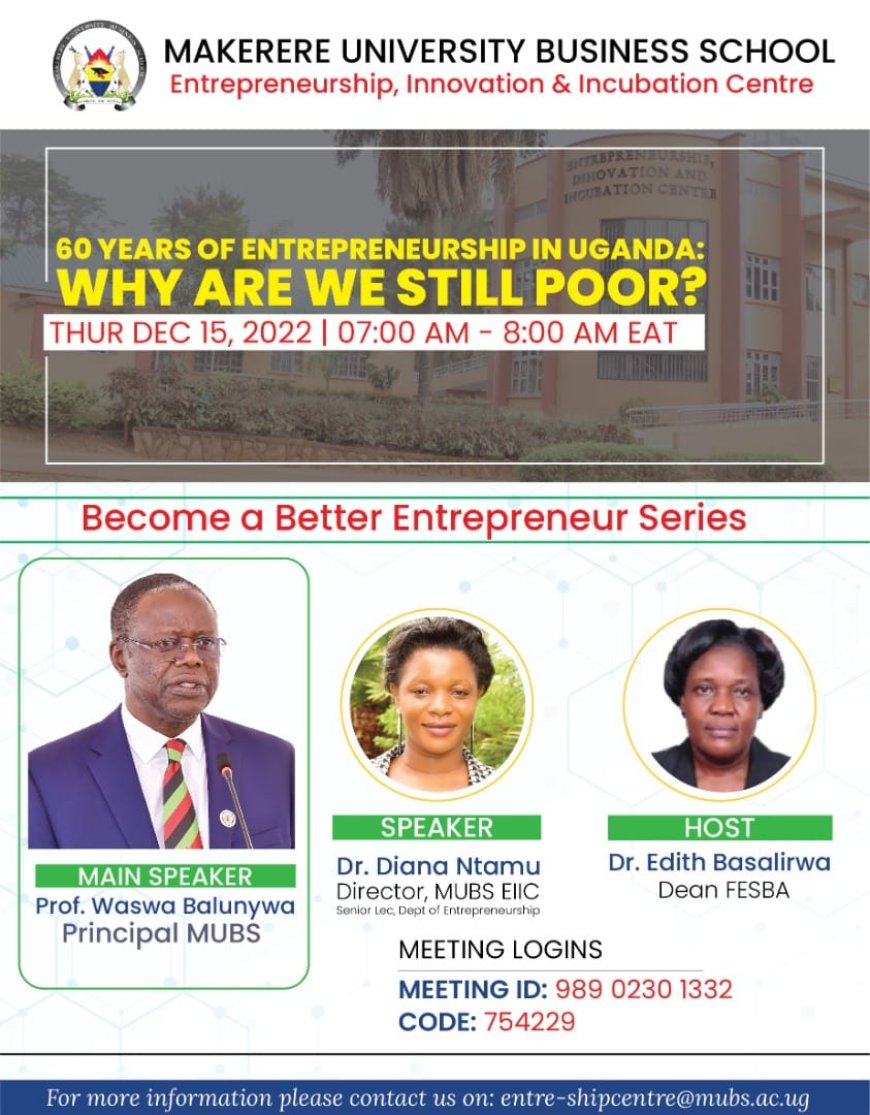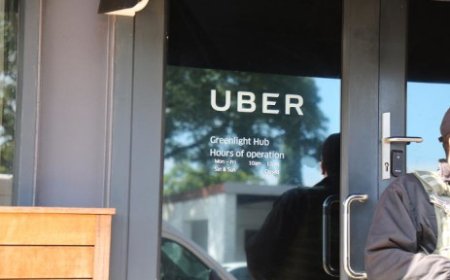The only way to fight poverty in Uganda is to adapt to modern technology, get everybody off the streets, take them back to school, and mechanize agriculture

KAMPALA - On Thursday 15th December 2022 during the weekly online “Become a better Entrepreneur series” organized by the MUBS Entrepreneurship Innovation and Incubation Centre.
Prof. Waswa Balunywa, Principal of MUBS discussed the topic: 60 years of Entrepreneurship in Uganda, why are we still poor? He says why do we look at other people growing and we are not growing? If you are an entrepreneur or not, what do you need to do?
After 60, Entrepreneurship is associated with creating economic value and profits.
There is a difference between the developed world and under developed world. Prof. Balunywa attributes slave trade as one of the reasons that has hindered Africa’s growth. “Because of colonization which contributed to slave trade when many talented and hardworking Africans were taken away to help the developed countries transform to the current industrial revolution, it affected and hindered Africa’s growth in terms of development that is why we are still lacking behind compared to the developed countries,” he noted.
“That created success in the developed countries and entrepreneurship is the key instigator of growth in communities,” he added. Prof. Balunywa revealed that after 60 years, many Ugandans remain poor because over 70% of the population still use traditional sources to produce for domestic consumption especially the hoe.
He says that the industrial revolution was developed and fueled by entrepreneurship.
“Britain with a mere population of 20 million then colonized many countries because it had the power, technology, resources. It is also a fact that they were able to create value, safeguard it and build a good army to protect her citizens from external aggression,” he added.
Prof. Balunywa took us through memory lane when he revealed that Uganda was colonized in 1873 by accident by business people who came through the Imperial British Company to trade particularly Lugard who later became a British government official. Uganda then supplied cotton, coffee, cooper without value addition and it affected us.
In 1903, the British introduced coffee to Ugandans so that we pay taxes.
In 1952, the Uganda Development Bank was established to steer industrial and commercial development although the ordinary Ugandans could not participate. This led to Y. K. Musaazi leading mass demonstrations in order for Ugandans to participate in the development of the country.
Prof. Balunywa says that it was assumed after Uganda gaining her Independence in 1962, it would become entrepreneurial but 60years down the road that has come to pass. Interestingly, the World Bank then recommended that Ugandans stay in agriculture and the backyard while foreigners’ businesses were thriving. That led to Indians thriving in trade and business.
Obote became leftist in 1968-1971 , then from 1971-1979 during Amin’s regime after the expulsion of Indians, the economy was heavily affected which hindered entrepreneurship in the country.
Obote II’s reign was affected because he invited investors to come and do business in Uganda. “When you do that, the whole world knows your country is not stable and remember during Obote II, there was instability making the country unsafe to thrive as an entrepreneur,” Prof. Balunywa noted.
In 1986 when the NRA regime took over power, they came with the 10-point program whose last point was the role of government as an Entrepreneur. In 1987, the government introduced the private sector led growth where entrepreneurs now take over the role of leading growth in the economy. But Prof. Balunywa insists that after all these years, Entrepreneurship has failed to succeed in Uganda.
According to the Uganda Bureau of Statics annual report of 2019/2020, 30% of Ugandans are poor compared to 56% in 1993. But Prof. Balunywa argues that when you compare the population growth, many more Ugandans may be poor compared to the UBOS report. Look at people who are wealthy, what defines them?
Some indicators of poverty in society include; lack of modern facilities people enjoy e.g. lack of access to computer, TV, Radio, modern transport, lack of access to safe drinking water (only 20% of the population can afford access to clean water), flashing toilets (30% of Ugandans don’t have a toilet, lack of electricity (although government has tried with rural electrification, only 20% of the population access it), poor infrastructure because government doesn’t have the money. Prof. Balunywa argues that because we have few entrepreneurs, it is hard for government to adequately collect taxes and also 70% of Ugandans are engaged in Agriculture and don’t pay taxes.
Also wars and conflict is one of the other causes of poverty and Uganda has suffered a lot of turmoil during 60 years and it is said most conflicts are fuelled by the international community who want to have a share of Africa’s raw materials.
Another important indicator is lack of business opportunity/ exposure. Lack of income leads to vulnerability of inability to produce and buy goods and services you would ordinarily buy. 70% of Africans produce for self-consumption.
The research done by the Global Entrepreneurship Monitor Studies which MUBS is part of revealed that 30% of Ugandans are Entrepreneurs while only 7% are in America but why is the latter super rich?
The main reason is Uganda has a large number of entrepreneurs although they have failed to create technologies that can transform society. We have over 1m boda bodas but what is there contribution to society meagre.
Prof Balunywa advises that in order to overcome the poverty problem, we need to get everybody off the streets back into schools, put emphasis on science, technical and vocational education.
He added that we also need to get rid of the hoe and produce higher value hence more income. Government needs to come up with a concerted long-term entrepreneurial program to make many Ugandans avert poverty.

































































































